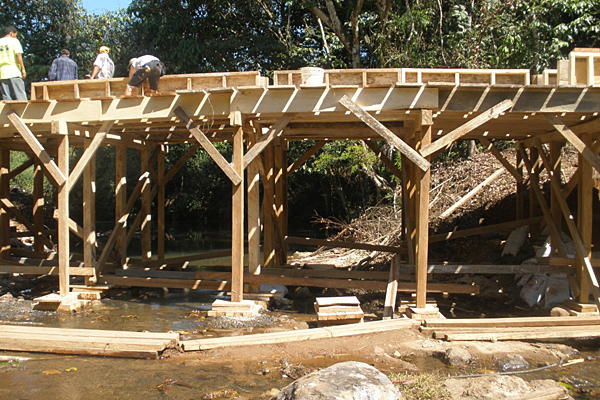
Engineering global solutions
UD's Engineers Without Borders chapter develops new ideas for global communities
8:36 a.m., May 6, 2015--Throughout the academic year, the University of Delaware’s chapter of Engineers Without Borders (EWB-UD) has been working on solutions to help improve the lives of people in communities around the globe.
The UD chapter, affiliated with the national organization Engineers Without Borders USA, was started in 2006 with the help of the late professor Steven Dentel, who played a large role as adviser to the group.
Global Stories
Fulbright awards
Peace Corps plans
Engineers Without Borders USA is a non-profit, humanitarian organization of dedicated and enthusiastic students and professionals who believe everyone should have access to adequate sanitation, safe drinking water and resources to meet their basic needs.
EWB-UD works closely with the national organization to ensure that they are complying with its guidelines.
EWB-UD is made up of students from each engineering department, though most members represent chemical and biomolecular engineering, environmental engineering and civil engineering.
Evan Ferguson, a junior civil engineering major and the public relations chair for EWB-UD, says that many students join the organization to gain experience and experiment with the skills they learn in class before entering the professional world.
“My main reasons for getting involved with EWB were to apply the fundamentals and concepts of engineering to the global community, and to be able to provide solutions to improve these global communities,” he says.
Right now, EWB-UD is focusing on two global projects. Each project, after getting approval from the national EWB organization, requires a minimum of five years for the chapter to complete.
The chapter coordinates with both the national organization, as well as a contact from the community that is being assisted, in order to discuss ideas, problems and travel plans for assessment and implementation of the project’s ideas.
When EWB-UD plans for a group to travel to one of these communities, no more than five students from the project team travel. These students, as required by national guidelines, must travel with an approved travel mentor as well as a responsible engineer in charge (REIC), who must also be approved by the national organization.
Projects in Malawi, Philippines
On April 22, EWB-UD held its annual benefit dinner, an event aimed at fundraising and generating awareness about the organization’s current and upcoming projects. At the event, members of the EWB community recapped their ongoing work in Malawi and announced a new project focused on water and sanitation in the Philippines.
The night also served as an occasion to celebrate Dr. Dentel’s commitment to EWB-UD since founding the organization in 2006. Special guests at the dinner included U.S. Sen. Chris Coons, former chairman of the Senate Foreign Relations Subcommittee on African Affairs, Babatunde A. Ogunnaike, dean of UD’s College of Engineering, and the family of the late and beloved Dr. Dentel.
Currently, the Malawi project, which is seeking to improve the water supply in villages in the Sakata region, is in the assessment stage. A travel team is preparing to travel in June for the group’s second assessment trip.
As for the Philippines project, which is still awaiting official approval from the national organization, the early goals are to find a way to improve the sanitation of local water supplies. The project team is hoping to make their first assessment trip later this summer.
Sarah Hartman, a sophomore environmental engineering major, serves as one of the project managers for the Philippines project. According to her, she was looking to get involved with EWB in some capacity even before she made a decision on which college to attend.
“I had heard of Engineers Without Borders in high school, and I wanted to do my part as a global citizen. So when I was applying to colleges, I was specifically looking for those that had some type of involvement with the organization,” she says.
EWB-UD has previously completed two projects through the national organization. The chapter’s first project, in Cameroon, focused on the building and implementation of a water distribution system that would improve the overall quantity and quality of drinking water accessible to local villages.
Another project, in Guatemala, involved constructing a bridge over a local river that would allow local residents to safely access schools and crop fields during periods when the river would flood.
Each EWB project is required by national guidelines to raise their own funding. All travel costs, project and building material costs, and any other additional costs must all be raised by the chapter itself.
For this reason, in addition to the annual benefit dinner, EWB-UD regularly holds fundraising events, as well as local community services projects in Delaware, in order to give back to the Delaware community and raise awareness for the projects that they are working on.
EWB-UD will have its next fundraising opportunity at the Engineering Olympics, an on-campus event and competition that is hosted by the chapter. All engineering majors from each department, as well as graduate students and faculty members, are encouraged to join and compete in this event, which will take place on Tuesday, May 12, at 7 p.m. in the Bacchus Theatre at the Perkins Student Center. The campus community is invited to watch the competition.
In the future, the chapter will look to broaden its scope, incorporating the expertise of students within the humanities and other science, technology, engineering and mathematics (STEM) disciplines in order to best serve its project communities.
For more information about Engineers Without Borders at the University of Delaware, visit their website or contact faculty advisers Kim Bothi and Abbie Clarke-Sather.
For more information about the national Engineers Without Borders USA organization, visit the national website.
Article by Craig Stack








